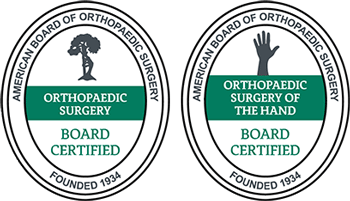Psoriatic Arthritis vs. Rheumatoid Arthritis
You may have heard of two of the most common types of arthritis, psoriatic and rheumatoid, but at first glance, you may not be aware of their differences. They both cause your joints to swell and become tender and originate with the immune system. However, they have some noteworthy differences, highlighted in this guide.
Contents
What Is Psoriatic Arthritis?
As a chronic inflammatory disease of the joints, psoriatic arthritis occurs where ligaments and tendons connect at the bone. Typically found in larger joints, especially those in the lower extremities, such as the distal joints of the toes, psoriatic arthritis can also affect the distal joints in the fingers and the sacroiliac joints of the pelvis. This disease produces scaly red and white patches on the skin mainly because the body’s immune system goes into overdrive to attack the skin.
Psoriatic Arthritis Causes
This type of arthritis can affect any age group, even children, but it most often develops in people aged 30 to 50. It usually occurs in those with skin psoriasis, especially those who have a family history of the condition. According to the American College of Rheumatology, about 15% of those who have psoriasis develop psoriatic arthritis.
Psoriatic Arthritis Symptoms
Psoriatic arthritis can develop slowly over time, or it can happen quickly. The symptoms vary from person to person and can even change locations. For instance, it can affect one or both knees. Certain people might develop this type of arthritis in a joint after they suffer an injury. Some common symptoms include the following:
- Tenderness, pain, or swelling near the tendons
- Fatigue
- Pain, throbbing, stiffness, and swelling in one or more joints
- Nail changes
- Reduced range of motion
When Should You See a Doctor?
Although there are no specific diagnostic tests for psoriatic arthritis, you should visit your doctor if your body starts experiencing any of those symptoms. Your doctor will observe you, ask about your medical history, perform a physical examination, and administer blood tests or X-rays. The blood tests can rule out other types of arthritis, such as osteoarthritis or rheumatoid arthritis. If you have psoriatic arthritis, your blood tests might reveal high inflammation levels as well as mild anemia.
Psoriatic Arthritis Treatment Options
It’s important to note, while there is no cure for this type of arthritis, several treatment options are available. These options vary, many of which aim to stop its progression, protect joints, and lessen pain. If you’re someone who only experiences mild arthritis, you might only need treatment when your joints are too painful. Your doctor may prescribe non-steroidal anti-inflammatory drugs for initial treatment. In certain instances, arthritis doesn’t respond to treatment, so the doctor might prescribe antirheumatic drugs. Several injectable or infusible biologic therapies target specific parts of your immune system.
What Is Rheumatoid Arthritis?

Image via Flickr by Clint__Budd
Rheumatoid arthritis is another inflammatory and autoimmune disease that can mistakenly attack your body’s healthy cells. As a result, you may experience painful swelling in certain areas of your body. This disease typically strikes many of your joints simultaneously, and you’ll commonly experience it in your knees, wrists, and hands.
Rheumatoid Arthritis Causes
Rheumatoid arthritis occurs as a response of the immune system attacking healthy cells. The specific causes are unknown, although certain factors can increase the possibility of developing the disease. It’s a genetic but not hereditary disease, which means that you might be susceptible to developing it due to genetics; it doesn’t mean you will inherit it. According to the Center for Disease Control and Prevention (CDC), certain genetic and environmental factors that can contribute are as follows:
- Age: Although it can begin at any age, the likelihood of having rheumatoid arthritis increases with age, and the highest onset occurs around age 60.
- Gender: Women are two-thirds more likely to develop rheumatoid arthritis than men.
- Genetics: Those born with specific genes called human leukocyte antigen (HLA) are more likely to develop rheumatoid arthritis.
- Smoking: Studies have shown that cigarette smoking increases the risk of developing rheumatoid arthritis and can exacerbate the symptoms.
Rheumatoid Arthritis Symptoms
When you have rheumatoid arthritis, you might find that your symptoms flare up or get worse, while other times, they are in remission or get better. Some of the more common symptoms include the following:
- Stiffness experience in more than one joint.
- Fever.
- Weight loss.
- Swelling or tenderness in more than one joint.
- Weakness.
- Tiredness.
- Similar symptoms take place on both sides of the body. For example, if you have it in your left knuckle, you’ll notice it’s also in your right knuckle.
When Should You See a Doctor?
To determine if you have rheumatoid arthritis, a doctor will review your symptoms, conduct a physical examination, and perform lab work. If you believe you’re experiencing this type of arthritis, it’s best to visit a doctor within six months of your first symptoms. That way, you can begin treatment to slow or stop the disease’s progression.
Rheumatoid Arthritis Treatment Options
Rheumatoid arthritis can be effectively managed and treated with certain medications and self-management strategies. These medications, called disease-modifying antirheumatic drugs, can slow the disease and prevent joint deformity. Self-management strategies include watching your weight, quitting smoking, and increasing activity levels. It’s helpful to aim for about 150 minutes each week of moderate physical activity. The CDC states that for every pound you lose, you also have a four-pound reduction in the load exerted on your knee.
Contact Dr. Knight at The Hand and Wrist Institute!
Dealing with swelling, pain, and stiffness in your joints can be frustrating, especially if you suffer from arthritis. If you believe you’re suffering from either type of arthritis, reach out to Dr. Knight at the Hand and Wrist Institute. During his time as a board-certified surgeon, he has treated many patients dealing with arthritis and has helped them find the best treatment options for them. Contact our office today to experience for yourself why Dr. Knight is one of the most accomplished specialists in the Dallas area.

























